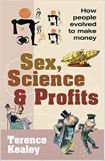Sex, Science and Profits by Terence Kealey
It's hard for me to think of a book to which I took so long to warm to. A phrase like there is no science, just scientists is going to be bit of an enthusiasm damper for a leftish libertarian, isn't it? But then I actually read the thing and discovered that Sex, Science and Profits has less of a clearly identifiable political angle than one would expect from a quick scan of the blurb, content, title, provocative quotations and some sampling.
| Sex, Science and Profits by Terence Kealey | |
|
| |
| Category: Politics and Society | |
| Reviewer: Magda Healey | |
| Summary: Anybody interested in economy, progress, wealth creation or the nature of science will probably find something of interest in this witty, engaging and breathtakingly erudite book - as long as they are capable of keeping their own biases and prejudices on hold. | |
| Buy? No | Borrow? Yes |
| Pages: 464 | Date: January 2008 |
| Publisher: William Heinemann Ltd | |
| ISBN: 978-0434008247 | |
|
| |
It doesn't mean Kealey doesn't have a very clear point to make, but in making it he's likely to step on toes left, right and centre of the political spectrum. Still, anybody interested in economy, progress, wealth creation or the nature of science will probably find something of interest in Sex, Science and Profits as long as they are capable of keeping their own biases and prejudices on hold and reading for the argument rather than being aroused to fight by the code words or associations.
Sex, Science and Profits is concerned with refuting two old Baconian theses. The first one claims that science is a public good that has to be funded by the state as the market will not provide it. Economists (at least some of them) claim that as fruits of science benefit everybody, it's impossible to charge for it and thus the market will not provide it unless government provided funds and companies are awarded patents for innovations. The second thesis states that science drives the development of technology which in turn, creates wealth, economic growth and increases in the standard of living.
Kealey constructs his own argument with breathtaking energy. Freely moving from evolutionary psychology to economics to political history to philosophy and back to evolution via the route of game theory (yes, the Prisoner's Dilemma makes its obligatory appearance), he's confident, persuasive, witty and entertaining while being, I suspect, at least occasionally, highly selective.
But some of his arguments are very persuasive. It's not science that drives technology, it's technology that drives technology. Necessity, not academic research, is the mother of invention. Innovation thrives in relatively free societies where individual property rights are protected and markets are allowed. Romans or Egyptians hardly invented anything, while the Dark Ages brought many technological advances.
Companies will innovate because that's how they manage to make money: by creating initially niche products that nobody else provides. The classical economy theory of perfect markets is nonsense: perfect markets don't exist and people don't act as profit-maximisers. Many will pursue invention for the love of discovery and chance of obtaining esteem, which is the key currency in human sexual selection. Patents hinder competition and result in suffering of the people denied affordable access to goods. Cutting-edge science is not a freely-available public good but a tacit good only available to those deemed trustworthy and productive enough to be admitted to the invisible colleges of science.
Kealey shows how the funding of R&D is related to GDP more than anything else, and when the government funding is cut, business and charitable funding steps in (and conversely, how government funding tends to crowd out private funding).
Most controversial, perhaps (at least to me), is his attitude to so called pure science, which should be pursued for itself, not because of supposed benefits to the economy (I actually really like this point - the repeated calls for vocationalisation of academia is one of the most terrible symptoms of the New Labour malaise). He admits that some (small) degree of government funding is not necessarily a bad thing, and then calls for abolition of research universities altogether (which, according to him, should concentrate on teaching - relatively cheap and easy to fund from fees and donations).
I found it the most jarring in the parts of the book that related to more recent chapters in economic history. Particularly, while discussing the growth of wealth in the UK during the time of the Industrial Revolution (and mentioning in passing both a relative and absolute reduction in the output of countries like India) he manages to completely ignore the Empire and the immense amount of wealth generated not via the innovation and technological development in the metropolis, but via the plunder and exploitation of the colonies. This would not fit in his argument as to essentially peaceful mercantile (semi)democracies being Good Things as far as wealth creation goes, and big bad warring empires being a Bad Thing.
A similar thing happens whenever he discusses war: assuming it to be natural that the state would fund military R&D (which in itself apparently generate less wealth than peacetime technologies) he ignores the wider effects of an engagement in a (successful) war for the growth in wealth and the substantial overspill from technologies (and infrastructure) developed for military uses to the civilian, commercial applications.
And finally, although he doesn't go as far as to claim that the relationship between industrial funders of R&D and pure science is always perfect, he devotes very little space to showing such imperfections while happily wallowing in tales of government negative influence.
Ultimately, assuming that the reader is persuaded as to the refutation of Baconian principles (and I can't imagine how one could not be, after reading this book - but then, I never really believed them fully myself) the question that really needs answering is one relating to funding of pure science and it is an ideological one. It amounts to how much do you trust the state, and do you trust it to do a better job of protecting your interest than corporations and/or charities would? Theoretically, in a democracy, it should. Practically, one can doubt it and a choice between the likes of George Bush and Tony Blair and the likes of Monsanto and Eli Lilly is one that I would be loath to have to make.
Recommended - for inspiration and critical reading.
I'd like to thank the publishers for sending a copy to The Bookbag.
For those worried about too much corporate power & influence on all things, including science we recommend The Corporation: The Pathological Pursuit of Profit and Power by Joel Bakan and Captive State: The Corporate Takeover of Britain by George Monbiot.
Please share on: ![]() Facebook,
Facebook, ![]() Twitter and
Twitter and
![]() Instagram
Instagram
![]() You can read more book reviews or buy Sex, Science and Profits by Terence Kealey at Amazon.co.uk Amazon currently charges £2.99 for standard delivery for orders under £20, over which delivery is free.
You can read more book reviews or buy Sex, Science and Profits by Terence Kealey at Amazon.co.uk Amazon currently charges £2.99 for standard delivery for orders under £20, over which delivery is free.
![]() You can read more book reviews or buy Sex, Science and Profits by Terence Kealey at Amazon.com.
You can read more book reviews or buy Sex, Science and Profits by Terence Kealey at Amazon.com.
Comments
Like to comment on this review?
Just send us an email and we'll put the best up on the site.

